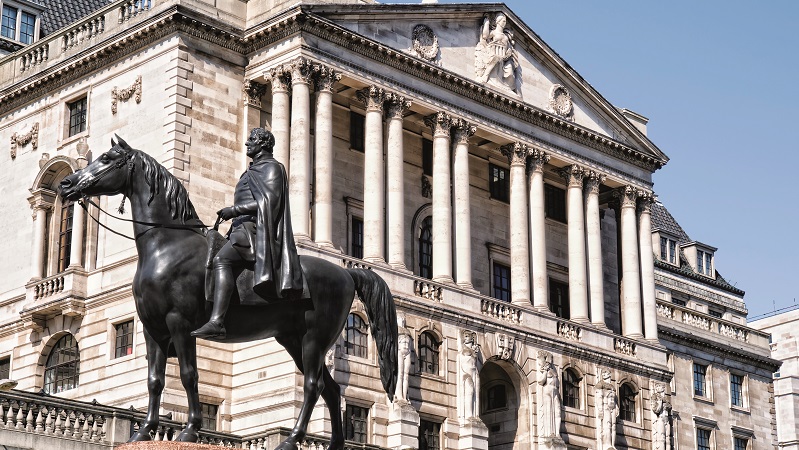The Bank of England has hiked rates to 0.5% as it attempts to stave off rising inflation in the UK, fuelled by soaring energy prices.
The Monetary Policy Committee voted by a majority of 5-4 to lift rates by another 0.25 percentage points, following its decision in December to increase rates from their historic low of 0.1%. It is the first time it has implemented back-to-back hikes since 2004.
Members in the minority voted for an even bigger increase of 0.50 percentage points, which would have brought the base rate to 0.75%.
Markets had been pricing in a second consecutive hike as a foregone conclusion as the Bank struggles to get a handle on rising inflation, which hit a 30-year high of 5.4% in December.
Alongside the February policy decision, economists are pencilling in three additional hikes in 2022, which would take rates to 1.25%, a level not seen since 2009.
Additionally, the MPC voted unanimously to start reducing its swollen balance sheet by not re-investing any of the £875bn government bonds it has purchased under its quantitative easing programme when they mature. It will also sell its £20bn stockpile of corporate bonds by the end of 2023.
BoE on the back foot as inflation forecast to hit 7.25%
“The Bank’s decision to raise rates for the second MPC meeting in a row indicates how seriously it takes the threat of inflation widening out,” said Fidelity International associate director Ed Monk.
“Many causes of the price rises we’re seeing are supply-driven and difficult for any central bank to bring under control, but rate-setters clearly believe the inflation is also being driven by demand factors too. With GDP only just having recovered the ground lost in the pandemic, it’s sobering to think that steam must now be taken out of the economy.”
The BoE is now forecasting inflation will hit 6% in the coming months before peaking at 7.25% in April, 2 percentage points higher than its earlier estimate in November. It said this was chiefly down to skyrocketing global energy and tradeable goods prices.
“The BoE is now making policy on the back foot and there is evidence they may have acted too late,” said Hinesh Patel, portfolio manager at Quilter Investors.
“The bad news for consumers is inflation is now likely to hit 7% and will remain elevated for at least the rest of this year. We do expect a sharp decrease come 2023, but this will be of little respite to consumers who are facing a huge increase to their monthly utility bills.”
April will be cruellest month for homeowners in decades
UK households are already facing an intense squeeze, with surging prices for energy, food and raw materials fuelling a national cost of living crisis. This is set to get much worse, following news earlier today the energy price cap will be lifted by 54% to £1,971.
“After a winter of discontent, April is set to be the cruellest month in decades for household finances,” said Interactive Investor senior personal finance analyst Myron Jobson.
“Creeping inflation, a national insurance hike and a new bumper energy price cap have conspired to create a perfect storm – and a financial headache for many. Even those not scraping by with skin of the teeth survival will now be on red alert as interest rates creep up.”
Bleak outlook for bonds but UK equities have ‘spring in their step’
Patel said investors will need to brace for more volatility in fixed income markets and “avoid it where possible”.
The BoE’s announcement has already sparked a government bond sell-off, with the 10-year UK gilt yield climbing 0.11 percentage points to 1.36%.
“Owning companies that can deal with price shocks will ultimately prevail, meaning quality will remain crucial while we navigate this rocky period,” Patel added.
Rising government bond yields will have an knock-on effect on share prices too, said Tilney managing director Jason Hollands, particularly richly valued tech stocks. The Nasdaq Composite index is already down 8% year-to-date, while the S&P 500 has fallen 3.8%.
However, for the UK market, which is home to “plenty of boring stuff” like banks, energy and commodity companies, the regime change should be positive, Hollands added.
“The UK stock market – for a long time a bit of laggard – now has a bit of a spring in its step. UK equities are up 3.4% in the start of the year.”
Hollands said banks look especially appealing “after many years cast out in the wilderness”. Since the December rate hike, shares in Lloyds Banking Group are up 19%, NatWest 16%, Barclays 15%, and Metro Bank 19% and if rates carry on going up, the “rebound could have much further to run”.
“Banks have been loathed for their role as arch villains in the financial crisis – but it might just be the time when investors are going to have to learn to love them again.”











